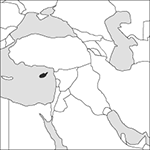
Capital:
Nicosia
Area:
9251 sq km (3572 sq miles) (south: 5896 sq km (2276 sq miles); north: 3355 sq km (1295 sq miles))
Population:
1,155,403 (combined; 2012 est)
Currency:
south: 1 euro = 100 cents; north: 1 Turkish lira = 100 kurush
Religions:
Greek Orthodox 78.0% (predominantly in the south); Muslim 18.0% (predominantly in the north)
Ethnic Groups:
Greek 77.0% (predominantly in the south); Turkish 18.0% (predominantly in the north)
Languages:
Greek, Turkish (both official)
International Organizations:
south: Council of Europe; UN; Commonwealth; Non-Aligned Movement; OSCE; EU; WTO; the north is recognized only by Turkey
An island country in the north-east corner of the Mediterranean Sea, with Turkey to the north and Syria to the east.
Physical
Cyprus is 225 km (140 miles) long and 97 km (60 miles) in breadth at its widest point. The Kyrenia coast on the north has a range of steep limestone mountains along most of its length. South of that is a treeless plain, hot and arid in summer, while further south still are igneous mountains rising to 1950 m (6400 feet).
Economy
In the south, such service industries as tourism, property, and financial services are important. The banking sector became over-large in the 2000s, which caused an economic crisis in 2012 (see eurozone crisis). Other important industries are food processing, cement, ship repair, and textiles. Cyprus (Greek, ‘copper’) still has some copper, as well as iron pyrites and asbestos. The north, by contrast, is primarily agricultural and is dependent on Turkish aid. The discovery of large offshore gas reserves will have a significant impact of the economies of both communities.
History
A Mycenaean colony in the 14th century bc, it was ruled successively by the Assyrian, Persian, Roman, and Byzantine empires. Richard I of England conquered it in 1191 and sold it to the French Crusader Guy de Lusignan under whom it became a feudal monarchy. An important base for the Crusades, it eventually came under the control of Italian trading states, until in 1571 it fell to the Ottoman empire. It remained part of the Ottoman empire until 1879, when it was placed under British administration. It was formally annexed by Britain in 1914 and in 1925 declared a crown colony. From the outset there was rivalry between Greek- and Turkish-speaking communities, the former, the majority, desiring union (enosis) with Greece. After World War II there was much civil violence in which the Greek Cypriot terrorist organization EOKA played the leading role. In 1959 independence within the Commonwealth was granted under the presidency of Archbishop Makarios, but by 1964 the government was in chaos and a United Nations peacekeeping force intervened. In 1974 a Greek Cypriot coup overthrew the President and Turkish forces invaded, gaining virtual control over most of the island. The Greek national government which had backed the revolt, collapsed. Talks in Geneva between Britain, Turkey, Greece, and the two Cypriot communities failed, and, although Makarios was able to resume the presidency in 1975, the Turkish Federated State of Cyprus was formed in northern Cyprus, comprising some 35% of the island, with its own President. In 1983 it proclaimed itself the Turkish Republic of Northern Cyprus. Britain retained an important RAF base, which was also a key intelligence centre. In the early 1990s the presidents of the two communities held talks on uniting the island, but no agreement was reached. Cyprus—in practice, the Greek south—joined the European Union in 2004. That same year a UN reunification plan was backed by Turkish Cypriots in a referendum but rejected by Greek Cypriots. Following the Credit Crunch, Cypriot banks came under financial pressure because of their large holdings of bad Greek debt. The international money markets lost confidence in Cyprus’s ability to support its over-large banking sector, and in June 2012 Cyprus requested assistance from the EU. A €10 billion loan was agreed in 2013 in return for a radical restructuring of the Cypriot banking sector involving large losses to investors. In the 2013 presidential elections the socialists lost power to the conservative Nicos Anastasiades. Later in the year talks with Turkish Cyprus stopped over disputes on exploring offshore gas fields. The 2015 election of the moderate Mustafa Akinci in Turkish Cyprus reinvigorated the UN-sponsored talks on reunification.
- instrumentation amplifier
- Instrumentation Laboratory
- instrumentation rack
- instrument control unit
- instrument damping
- instrument pointing system
- instrument rating
- instrument sensitivity
- instrument shunt
- instrument transformer
- instrument unit
- insufficient reason, principle of
- insula
- insulate
- insulated-gate bipolar transistor
- insulated-gate field-effect transistor
- insulating barrier
- insulating resistance
- insulation
- insulator
- insulator–superfluid transition
- insulin
- insulin-like growth factor
- insurance
- insurance company